It’s important to know the early signs of colon cancer in women. This knowledge can lead to better treatment and outcomes. Colon cancer symptoms in women can be hard to spot, so staying alert is key. Women need to know the signs that are different from men’s.
Bowel cancer in women can show up in many ways, like changes in bowel habits or unexpected weight loss. Knowing these signs helps women watch their colorectal health closely. By recognizing these warning signs, women can get medical help early. This can help find problems before they get worse.
This guide will help you understand colon cancer symptoms in women. It’s packed with information to help keep you healthy. Let’s look at the important signs every woman should know about colorectal health.
Understanding Colon Cancer Symptoms in Women
Colon cancer signs in women can be subtle and often overlooked. It’s important to recognize these early warning signs for timely diagnosis and treatment. Let’s explore the unique aspects of intestinal cancer in women and how they differ from men.
Gender-Specific Risk Factors
Women face distinct risk factors for rectal cancer. Obesity and sedentary lifestyles increase the risk. Regular physical activity and maintaining a healthy weight can help reduce the chances of developing colon cancer.
Age-Related Considerations
While colon cancer can occur at any age, it’s more common in older adults. Women over 50 should be extra careful about screening. Regular colonoscopies can detect precancerous polyps before they become cancer.
| Age Group | Screening Frequency | Recommended Test |
|---|---|---|
| 45-75 years | Every 10 years | Colonoscopy |
| 76-85 years | Based on individual factors | Colonoscopy or other screening methods |
| Over 85 years | Not typically recommended | Discuss with healthcare provider |
Hormonal Influences on Symptoms
Hormones play a big role in colon cancer development and symptoms in women. Estrogen may offer some protection against colon cancer, which explains why post-menopausal women are at higher risk. Hormone replacement therapy should be discussed with a healthcare provider to weigh the benefits and risks.
Understanding these gender-specific factors can help women identify colon cancer symptoms early. If you experience persistent changes in bowel habits, unexplained weight loss, or abdominal discomfort, see your doctor right away. Early detection of intestinal cancer in women significantly improves treatment outcomes and survival rates.
Common Digestive Changes as First Warning Signs
Women might ignore signs of gastrointestinal cancer in their digestive changes. Early detection is key for treating digestive cancer in women. Spotting these signs early can lead to timely medical checks and screenings.
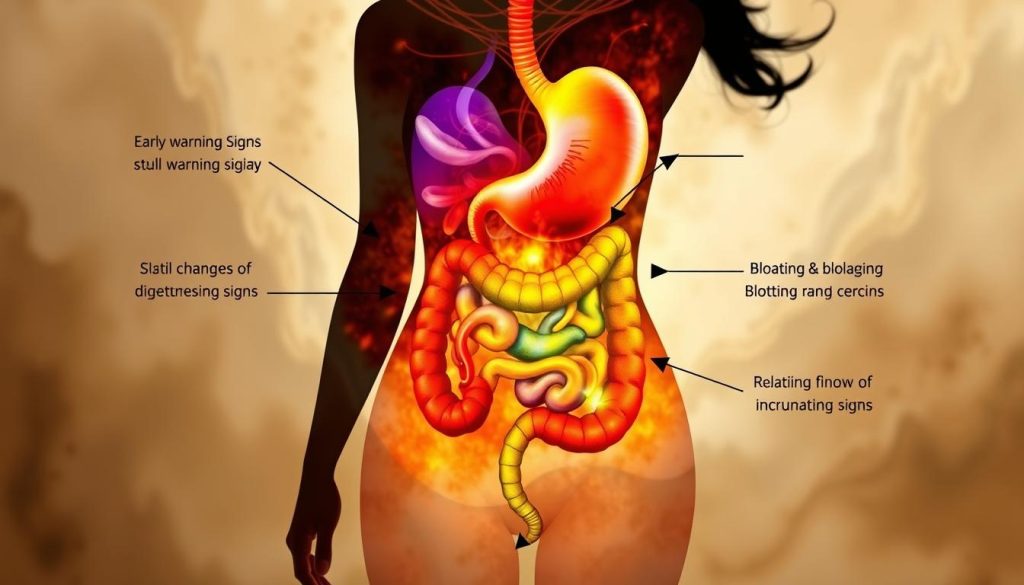
Changes in bowel habits often point to underlying issues. Women might see more constipation, diarrhea, or changes in stool. These symptoms, lasting more than a few weeks, need attention.
Abdominal discomfort is another warning sign. Women might feel bloated, crampy, or full even after small meals. This ongoing discomfort could be a sign of gastrointestinal cancer in women.
| Warning Sign | Description | Action |
|---|---|---|
| Bowel Changes | Persistent constipation, diarrhea, or altered stool consistency | Consult doctor if lasting over 2 weeks |
| Abdominal Discomfort | Ongoing bloating, cramps, or fullness | Seek medical advice if persistent |
| Unexplained Weight Loss | Unintentional weight loss without diet changes | Schedule a check-up immediately |
Unexplained weight loss is a concerning sign. Women who lose weight without diet changes should see a doctor. This could be a sign of digestive cancer or other health issues.
By paying attention to digestive changes, women can protect their gastrointestinal health. This helps keep their overall well-being safe.
Unexplained Weight Loss and Appetite Changes
Weight changes and appetite shifts can signal colon cancer in women. These signs might seem unrelated to colon health. But they’re key colon cancer symptoms in women to spot.
Sudden Weight Fluctuations
Unexplained weight loss is a warning sign. If you’re losing weight without dieting, it’s time to act. Colon cancer can block nutrient absorption, causing quick weight loss.
Changes in Eating Patterns
Women with colorectal cancer often see appetite changes. You might feel full fast or lose interest in food. These shifts can come from tumors affecting digestion.
Metabolic Disruptions
Cancer can change your metabolism. This can lead to fatigue, weakness, and more weight changes. It’s your body’s way of saying something’s wrong.
| Symptom | Possible Cause | Action |
|---|---|---|
| Unexplained weight loss | Impaired nutrient absorption | Consult doctor |
| Decreased appetite | Tumor affecting digestion | Track food intake |
| Fatigue with weight changes | Metabolic changes | Monitor energy levels |
These symptoms don’t always mean cancer. But they’re worth checking out. Early detection can greatly improve treatment outcomes for colon cancer.
Bowel Movement Patterns and Warning Signals
Changes in bowel habits can signal intestinal cancer in women early. It’s key to notice these shifts for early detection and treatment. Women should look out for several important changes that need medical attention.
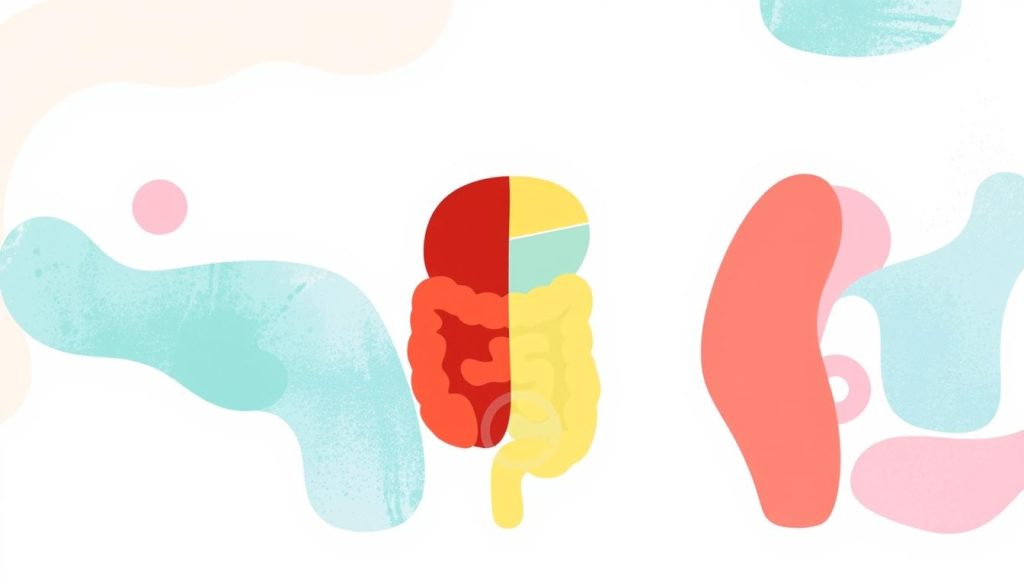
First, watch for changes in how often you go. A sudden change in bowel frequency is a red flag. For example, if you go from daily to several times a week, or the other way around, it’s a sign to check in with a doctor.
Stool consistency is also vital. Look out for ongoing diarrhea or constipation that lasts more than a few days. Stools that are unusually narrow or ribbon-like could be a warning sign of bowel cancer in women.
Don’t ignore discomfort during bowel movements. Persistent straining, pain, or feeling like you’re not fully emptying can be signs of intestinal cancer in women.
| Warning Signal | Potential Indication | Action |
|---|---|---|
| Sudden frequency change | Possible bowel obstruction | Consult doctor if persists |
| Narrow, ribbon-like stools | Potential tumor growth | Seek immediate medical attention |
| Persistent discomfort | Possible inflammatory condition | Schedule check-up with gastroenterologist |
While these signs can be scary, they don’t always mean cancer. Many other conditions can cause similar symptoms. But if these changes last more than a few weeks, it’s time to see a doctor. Catching bowel cancer early can greatly improve treatment outcomes and your overall health.
Abdominal Pain and Discomfort Patterns
Abdominal pain in women can signal many health issues, including colon cancer. Knowing the patterns of discomfort is key to early detection and timely medical help.
Location of Pain
Colon cancer signs in women often show up as pain in certain parts of the abdomen. The lower left area is common, as it’s where the descending and sigmoid colon are. Pain in the upper right might point to problems in the ascending colon.
Types of Abdominal Discomfort
Women with colon cancer may feel different kinds of abdominal discomfort:
- Cramping or gnawing pain
- Bloating or fullness
- Gas-like pain that doesn’t resolve
- Tenderness when pressing on the abdomen
Duration and Intensity
The length and how bad the pain is can tell us a lot about colon cancer symptoms:
| Duration | Intensity | Potential Concern |
|---|---|---|
| Persistent (weeks) | Moderate to severe | High |
| Intermittent | Mild to moderate | Moderate |
| Brief episodes | Mild | Low (but monitor) |
If you have persistent or getting worse abdominal pain, see a healthcare provider right away. They can check for colon cancer.
Blood in Stool: When to Be Concerned
Blood in stool can be a warning sign for various health issues, including rectal cancer in women. It’s important to know when this symptom needs immediate medical attention.
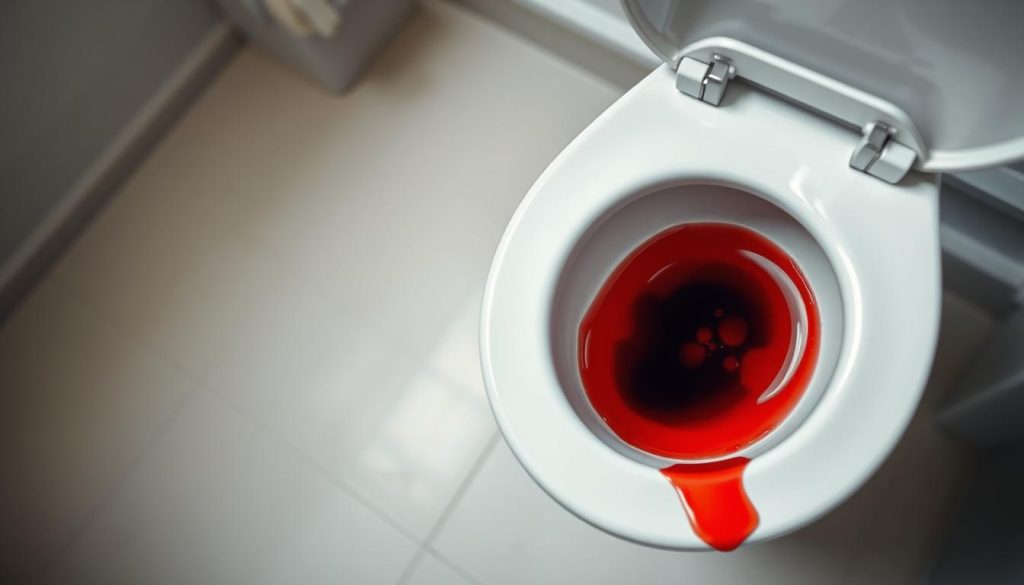
The look of blood can vary. Bright red blood might mean bleeding in the lower digestive tract. Darker blood could suggest bleeding higher up. For women worried about colorectal cancer, understanding these differences is key.
Not all blood in stool means cancer. Hemorrhoids or anal fissures can cause similar symptoms. Yet, if bleeding keeps happening or comes back, you should see a doctor. This is true for women over 50 or those with a family history of colorectal cancer.
| Blood Appearance | Possible Cause | Action Needed |
|---|---|---|
| Bright red | Hemorrhoids, fissures, lower GI bleeding | Monitor, see doctor if persistent |
| Dark red or maroon | Upper GI bleeding, possible colorectal issues | Seek prompt medical attention |
| Black, tarry stools | Upper GI bleeding, possible tumors | Immediate medical evaluation |
Women should never ignore blood in their stool. While it might not always signal rectal cancer, getting it checked out quickly is important. Regular screenings are key in preventing and detecting colorectal cancer in women.
Fatigue and Weakness as Early Indicators
Feeling tired is normal, but constant fatigue can mean something serious. It might be a sign that your body is fighting an illness.
Energy Level Changes
Women with early colon cancer often feel extremely tired. You might need more sleep or get exhausted easily. This tiredness is different and doesn’t get better with rest.
Physical Performance Impact
As colon cancer gets worse, it can weaken your body. You might find it hard to do simple things like climb stairs or carry groceries. This weakness is a warning sign.
Associated Symptoms
Fatigue in women with digestive cancer often comes with other signs. These can include:
- Unexplained weight loss
- Loss of appetite
- Pale skin or anemia
- Frequent nausea
If you’re tired all the time and have these symptoms, see your doctor. Catching colon cancer early can lead to better treatment and outcomes.
| Normal Tiredness | Cancer-Related Fatigue |
|---|---|
| Improves with rest | Persists despite rest |
| Occasional | Constant or frequent |
| Doesn’t affect daily activities | Interferes with normal life |
| No associated symptoms | Often accompanied by other signs |
Recognizing Gastrointestinal Changes
Women should watch for changes in their gut that might mean colon cancer. These changes in how you digest food can be early signs. It’s important to listen to what your body is telling you.
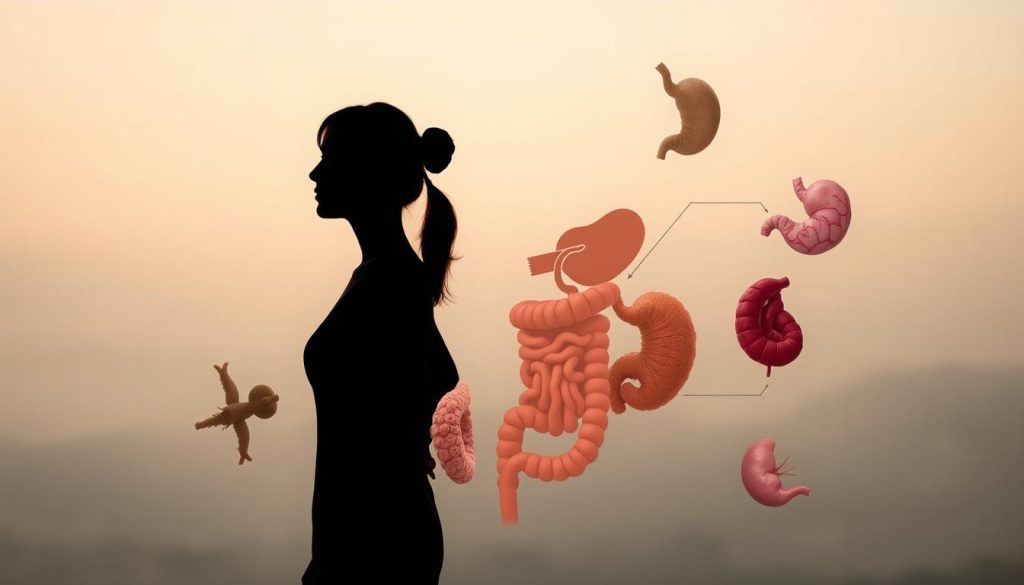
Persistent bloating is a symptom many women ignore. If you often feel bloated and it doesn’t go away with diet changes, talk to your doctor. This could be a sign of colon cancer that women should not ignore.
Changes in how often you go to the bathroom are also important. This includes going too often or too infrequently, or having narrow, ribbon-like stools. These signs might mean you have gastrointestinal cancer and need to see a doctor.
Unexplained nausea or vomiting is another warning sign. While many things can cause these symptoms, if they keep happening, see a doctor. It’s better to be safe than sorry.
| Gastrointestinal Change | Possible Indication | Action Required |
|---|---|---|
| Persistent Bloating | Potential colon issue | Consult doctor |
| Altered Bowel Habits | Possible colon abnormality | Seek medical evaluation |
| Frequent Nausea/Vomiting | Digestive system concern | Discuss with healthcare provider |
Early detection is critical in treating gastrointestinal cancer in women. If you notice any unusual changes in your digestive system, don’t wait to get medical advice. Your health is worth it.
The Role of Colon Polyps in Cancer Development
Colon polyps are key in the growth of colorectal cancer in women. These small growths on the colon lining can turn into cancer cells. Knowing about the different polyps and their risks is key for early detection and prevention of colon cancer.
Types of Polyps
There are several types of colon polyps women may develop:
- Adenomatous polyps: Most common and potentially cancerous
- Hyperplastic polyps: Usually small and rarely cancerous
- Inflammatory polyps: Often linked to inflammatory bowel disease
Risk Assessment
Factors that increase the risk of colon polyps in women include:
- Age over 50
- Family history of colorectal cancer
- Obesity
- Smoking
- Excessive alcohol consumption
Screening Importance
Regular screening is vital for detecting and removing polyps before they become cancerous. Women should follow these guidelines:
| Age | Recommended Screening |
|---|---|
| 45-75 | Regular colonoscopy every 10 years |
| 76-85 | Screening based on personal risk factors |
| 85+ | Screening not recommended unless high risk |
Early detection through screening can greatly reduce the risk of colorectal cancer in women. By understanding the types of polyps and their cancer risk, women can take steps to protect their health.
Family History and Genetic Risk Factors
Knowing your family history is key to understanding your colon cancer risk. Women with a relative who had colon cancer are more likely to get it too. It’s vital to know your family’s health history.
Genetics also play a big role in colon cancer risk. Some inherited conditions, like Lynch syndrome and familial adenomatous polyposis, raise your risk a lot. These conditions often cause colon cancer symptoms to appear earlier in women.
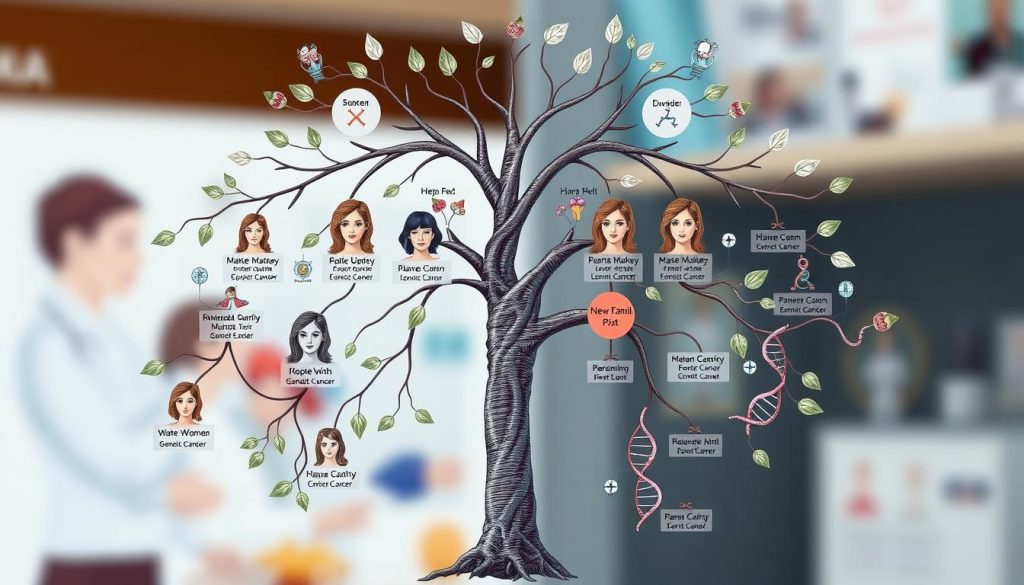
Genetic tests can spot these syndromes. If your family has a lot of colon cancer, talk to your doctor about genetic testing. Early detection through genetic screening can lead to better prevention and treatment.
| Risk Factor | Increased Risk | Recommended Action |
|---|---|---|
| First-degree relative with colon cancer | 2-3 times higher | Earlier screening, starting at age 40 or 10 years before the youngest case in the family |
| Lynch syndrome | Up to 80% lifetime risk | Annual colonoscopy starting at age 20-25 |
| Familial adenomatous polyposis | Nearly 100% lifetime risk | Annual colonoscopy starting at age 10-12 |
Understanding your genetic risk and family history can help you manage your colon cancer risk. Regular screenings and healthy lifestyle choices can catch colon cancer symptoms early or stop it from happening.
Preventive Screening Guidelines for Women
Regular screening is key for early detection of colon cancer signs in women. Understanding the guidelines can help you stay proactive about your health.
Age-Based Recommendations
Women should begin regular colon cancer screenings at age 45. Those with a family history of intestinal cancer may need to start earlier. Talk to your doctor about your risk factors.
Screening Methods
Several effective screening options exist for detecting colon cancer signs in women:
- Colonoscopy
- Fecal immunochemical test (FIT)
- Stool DNA test
- Flexible sigmoidoscopy
Frequency Guidelines
The frequency of screenings depends on the method used and your personal risk factors. Here’s a general guide:
| Screening Method | Frequency |
|---|---|
| Colonoscopy | Every 10 years |
| FIT | Yearly |
| Stool DNA test | Every 3 years |
| Flexible sigmoidoscopy | Every 5 years |
Remember, these are general guidelines. Your doctor may recommend a different schedule based on your specific health needs and risk factors for intestinal cancer in women.
Lifestyle Factors Affecting Colon Cancer Risk
Women can take steps to lower their colon cancer risk. Eating more fruits, vegetables, and whole grains can help. It’s also smart to eat less red and processed meats, as they increase risk.
Regular exercise is important for colon cancer prevention. Try to do at least 150 minutes of moderate activity or 75 minutes of vigorous activity weekly. Keeping a healthy weight also helps lower risk.
Smoking and too much alcohol raise the risk of colorectal cancer. Quitting smoking and drinking only one drink a day can help. Staying hydrated and managing stress also offer benefits.
By making these lifestyle changes, women can control their health and possibly prevent colon cancer. Remember, early detection through screenings is key to treating colorectal cancer early.
FAQ
Q: What are the early warning signs of colon cancer in women?
A: Early signs of colon cancer in women include changes in bowel habits and persistent discomfort. You might also notice unexplained weight loss, fatigue, and blood in the stool. Remember, symptoms can vary, and some women might not notice them early on. This is why regular screenings are so important.
Q: How do colon cancer symptoms differ in women compared to men?
A: Symptoms of colon cancer can be similar for both men and women. But, women might notice more subtle changes in bowel habits. They might also experience menstrual-like cramping or symptoms that seem like gynecological issues. Fatigue is another symptom women might notice early on.
Q: At what age should women start screening for colon cancer?
A: Women should start colon cancer screenings at 45 if they’re at average risk. If you have a family history of colon cancer or other risk factors, your doctor might suggest starting earlier. It’s important to talk to your healthcare provider about your risk to find out when to start screening.
Q: How does family history affect a woman’s risk of colon cancer?
A: Family history greatly affects a woman’s risk of colon cancer. If a first-degree relative has colon cancer, your risk is two to three times higher. Having multiple relatives with colon cancer or being diagnosed at a young age increases your risk even more. Knowing your family history helps determine the right screening and prevention steps.
Q: What lifestyle changes can women make to reduce their risk of colon cancer?
A: To lower your risk of colon cancer, try these lifestyle changes: stay at a healthy weight, exercise regularly, and eat less red and processed meat. Increase your fiber intake from fruits, veggies, and whole grains. Also, limit alcohol, avoid smoking, and manage stress. These changes help reduce your risk and improve your overall health.
Q: How often should women undergo colonoscopies?
A: Women at average risk should have colonoscopies every 10 years starting at 45. If you have a higher risk or polyps are found, you might need more frequent screenings. Always follow your healthcare provider’s advice on how often to have a colonoscopy.
Q: Can hormonal factors influence colon cancer risk in women?
A: Yes, hormonal factors can affect colon cancer risk in women. Estrogen seems to protect against colon cancer, which is why post-menopausal women might have a higher risk. Hormone replacement therapy and oral contraceptives can also impact risk. Discussing these factors with your healthcare provider is important for assessing your risk.
Q: What is the significance of blood in the stool for women?
A: Blood in the stool is a serious warning sign that should not be ignored. It can be caused by many things, including colon cancer. Women should watch for bright red, dark red, or black blood in their stool. If you notice blood, get medical help right away to find out why.
Q: How do colon polyps relate to cancer risk in women?
A: Colon polyps are growths that can turn into cancer over time. Not all polyps become cancerous, but some types, like adenomatous polyps, have a higher risk. Regular screenings help find and remove polyps before they can turn into cancer, lowering your risk.
Q: What role does diet play in colon cancer prevention for women?
A: Diet is key in preventing colon cancer for women. Eating more fruits, veggies, whole grains, and lean proteins can help. Limit red and processed meats, high-fat foods, and alcohol. Fiber, folate, calcium, and vitamin D also offer protection. A balanced diet is essential for preventing colon cancer.

















